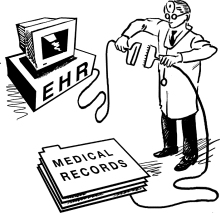Why I Hope to Help End EHR’s Lack of Interoperability
 Donald Voltz, MDI am tired of waiting. Millions of medical professionals and patients are tired of waiting. We have been waiting for EHR interoperability since the dawn of EHRs in the 1960s. Enough is enough! Our goal is to achieve EHR interoperability through a grass roots coalition of medical professionals and patients who are tired of waiting.
Donald Voltz, MDI am tired of waiting. Millions of medical professionals and patients are tired of waiting. We have been waiting for EHR interoperability since the dawn of EHRs in the 1960s. Enough is enough! Our goal is to achieve EHR interoperability through a grass roots coalition of medical professionals and patients who are tired of waiting.
The simple life-saving ability of hospital EHRs to connect to one another so healthcare providers can easily and readily access patient data is not being addressed. This type of issue is traditionally solved by industry or government initiatives. But so far they have not, and apparently will not solve it so I have decided to raise this issue through an outpouring of angry citizens, hospital patients, physicians and others being impacted.
Petition on Change.org
I have posted a petition on Change.org to demand EHR operability. Please visit the site and sign it if you are tired of waiting and want change now. This is an issue that affects all U.S. Citizens. My goal is gather 25,000 signatures so the petition is reviewed by the White House and acted upon. I don’t care is this is done through an executive order, a law passed in Congress or industry initiative, as long as it is done.
By signing the petition, we are telling the President and Congress that we need a direct path of communication between all EHR systems through a specific and comprehensive policy of interoperability.
Why do we need government intervention?
- There has been no improvement in patients’ health information flow in medical communications systems and no support for sharing this crucial data flow among care providers since the transition from paper to electronic medical records. The result is the high number of medical errors leading to death will remain unchanged without government intervention.
- Hospital boards have no incentive to adopt technology to solve the problem because inaction costs less money than fixing it. The result? Hospitals are not actively looking for a solution, unless it is mandated as part of a government intervention, similar to the same intervention to transition from paper to electronic medical records.
- Most of healthcare vendors, notably electronic health record (EHR) vendors, have no incentive to address these issues in order to push for their own product solutions. This leaves the lack of EHR interoperability, the most critical area to reduce medical errors leading to death, with no near term improvement.
- Existing government bodies are in place, but the focus and timetable are not aligned with the urgency for improving patient outcomes, which claim US lives on a daily basis.
- Approximately 400,000 Americans die every year because of industry self interests, slow pace of government oversight and care providers stuck in the middle. In the end, patients are the customers, yet they are bearing the brunt of this disservice.
 More than 1,000 Die Daily
More than 1,000 Die Daily
At a recent senate subcommittee hearing, it was revealed that more than 1,000 people are killed and 10,000 injured every day due to medical errors largely caused by technology mistakes. Approximately 40% of these errors are directly related to information omissions and miscommunications. Why do these errors occur?
Many of these errors are a direct result of a technological communication disconnect within the electronic medical record system. Simply put, these programs designed to make access to crucial medical information easier do the opposite.
The average hospital operates competing EMR’s systems; none of which can share information with each other and all of which present that information in completely different ways, causing confusion by healthcare providers and taking away time with patients. The result are misread charts and forgotten results. Patients are also put at risk by healthcare providers who might not receive timely data in a life threatening crisis.
6th in the U.S. for Deaths
If the Center for Disease Control reported a category for erroneous medical deaths, it would rank 6th in the U.S. And the cost? A cool trillion dollars a year. Sadly, this figure is not too far from similar statistics found 15 years ago. By implementing an EHR connectivity solution, hospitals and medical professionals would save billions in lower insurance premiums as there will be fewer medical death and error lawsuits. These actions will lower medical costs and will benefit everyone.
The medical industry has had many opportunities to bring about interoperability. The January 2009 passage of the Health Information Technology for Economic and Clinical Health Act (HITECH), a $30 billion effort to transform healthcare delivery through widespread use of EHR technology. Also, the Meaningful Use EHR Incentive Program requirements have helped to create greater commonality in basic EHR functions across systems at a much faster pace than would have otherwise occurred.
Please join me in helping bring an end to this tragedy!
- Tags:
- better healthcare communications systems
- Center for Disease Control (CDC)
- Change.org
- closed source EHRs
- deaths by medical errors
- Donald M. Voltz
- EHR Incentive Program
- EHR interoperability
- EHR vendors
- Electronic Health Record (EHR)
- electronic healthcare communications
- electronic medical records (EMR)
- health information flow
- Health Information Technology for Economic and Clinical Health Act (HITECH)
- healthcare pharmaceutical complex
- Improving Patient Outcomes
- improving patient survival rates
- lack of EHR interoperability
- Meaningful Use (MU)
- medical communications systems
- medical errors
- medical miscommunications in healthcare systems
- missing medical data
- national grassroots petition
- Obamacare
- Login to post comments
Comments
This is the time to raise
This is the time to raise these issues. Rep. Michael C. Burgess, MD (R-Texas) and his staff are currently working on a bill to fix the interoperability issue. The draft bill still does not address the fundamental problem which is greed. There are no technical issues when it comes to health IT interoperability, as any reader of Open Health News can tell from just a few of our articles. The problem is business models. EHR vendors are into making money first and they "lock-in" the users multiple ways so they can charge for the proprietary EHR licenses and keep their customers from migrating, and also charge for data exchange and any connectivity.
Bettina Experton form Humetrix lays out one obvious, fast, and inexpensive solution, not currently contemplated by the bill, which is to make the medical records available when and where they are needed through personal health records (PHRs). The key to this would be legislation mandating that providers make their records available to the patients directly through their PHR. Congress made this mess by letting vendors, who wrote the HITECH act, direct policy. Congress needs to fix this now.